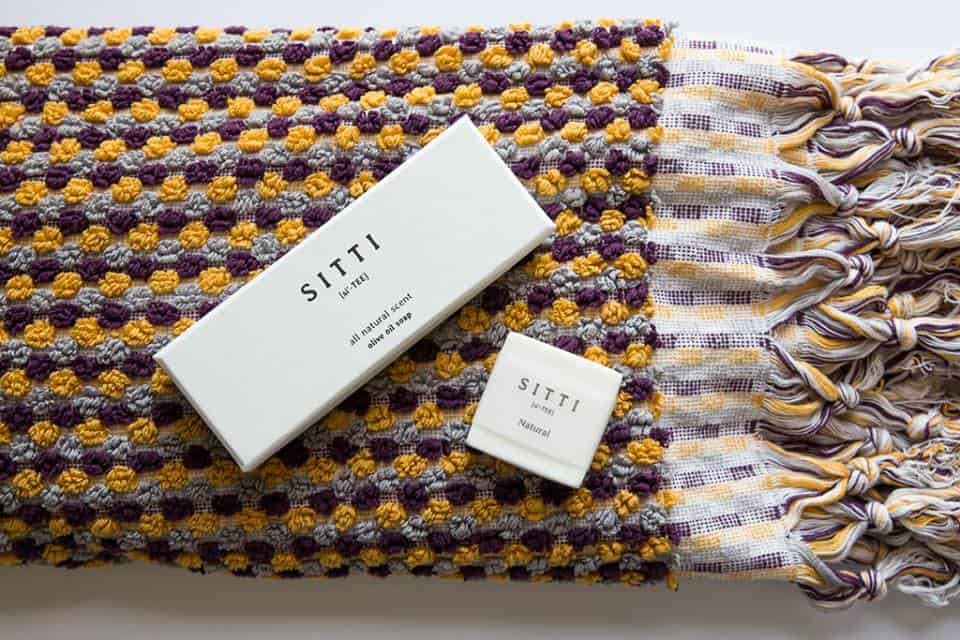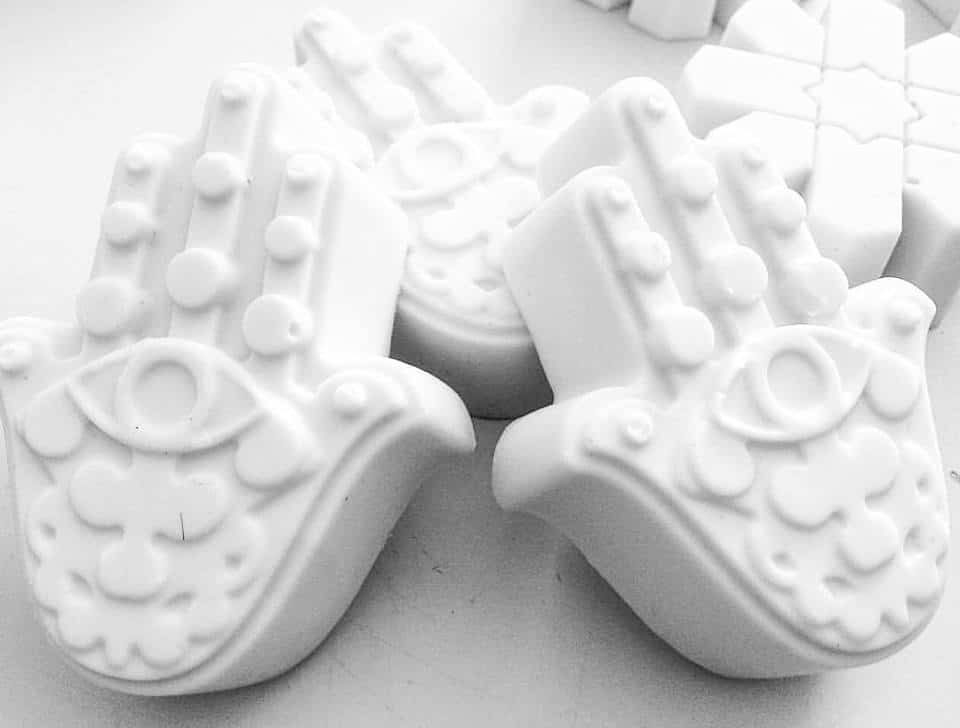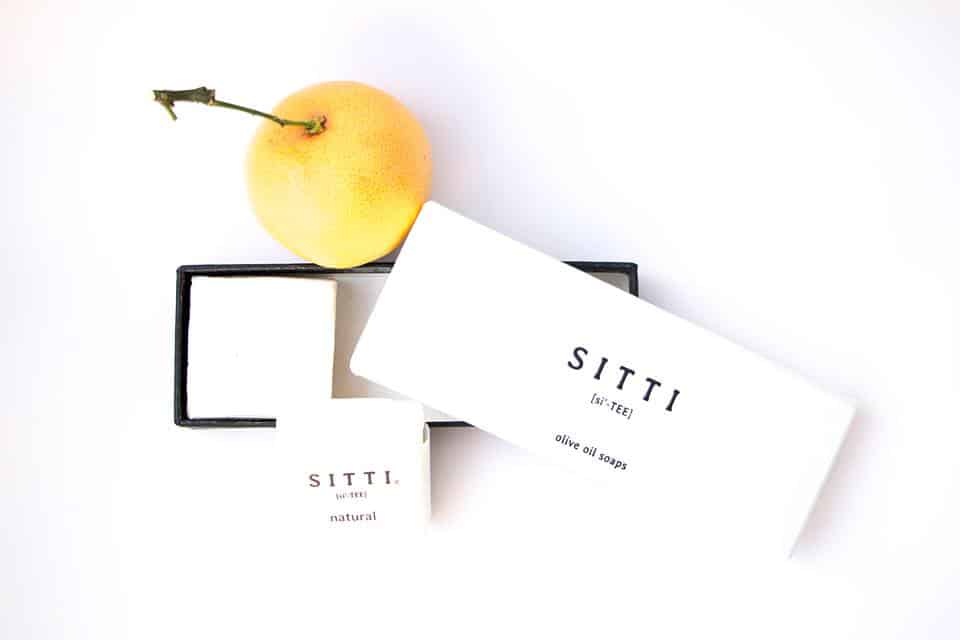SITTI Soap is a social enterprise with an aim to empower and restore hope to refugee women through the making of handmade soap. Every olive oil bar is handmade, all natural, and free of toxins, preservatives, animal by-products, alcohol and additives. Before I knew of SITTI Soap, I was introduced to one of the co-founders, Noora Sharrab.
Her radiant smile and passion for doing good is what drew me to learn her story. Since 2011, Noora has been continuous developing opportunity for Palestinian refugees through her NGO, Hope for Women in Education, providing annual scholarships to Palestinian women. The beautiful connection she shares with the young Gaza women of the Jerash Camp in Jordan, as well as her Gazan heritage, is what drew her to continue growing the organization.
Her partner, Jackie Sofia, had also been connected with the women of the Jerash Camp in 2011 while working with the refugee settlement community during her Fulbright Fellowship in Baltimore, Maryland. Three years later, these two incredible women have come together, inspired by the thousands of women in the Jerash Refugee Camp.
The stories of hope they have to share are endless. See below for a Q & A with Jackie Sofia, co-founder of SITTI Soap.
Tell us about the Jerash Refugee Camp in Jordan
Our inspiration has, and always will be, the incredible resilience and determination of the women in Jerash Camp. These were the qualities that we both came to know and deeply admire when we first started working on behalf of other NGOs inside Jerash Camp.
We maintained close relationships with different circles of refugee women we met through our work, and employment was always a topic of conversation in those circles. These refugee women wanted to work, and they had an incredible amount of energy and skills to contribute towards a job. Many of the Palestinian traditions passed down to women in the family include things like embroidery and soap making. And many of them had tried, on numerous occasions, to create businesses out of their homes.
However, all of these women are ex-Gazan refugees. Unlike many Palestinian refugees who entered Jordan before 1967, ex-Gazan refugees were not granted citizenship when they fled their homes to neighboring Jordan. They are effectively stateless. Unemployment in Jordan is already high (15.8% in January 2017), with the majority of jobs provided by the government. An ex-Gazan’s lack of citizenship cuts them off from most government jobs, as well as borrowing small business loans from Jordanian banks.
Despite all of these hurdles, the women in Jerash Camp don’t bury their heads in the sand. They have always come up with new and innovative ideas to keep things afloat. Although this is admirable, it’s not sustainable, nor is it fair. They deserve steady employment to secure their futures and the future of their families.

Why olive oil-based soap?
“Sitti Soap” is based in a Palestinian refugee camp, and one of our goals is to preserve the traditions of the women (and men) in the camp. As a refugee population that has lost so much in the past 60 years – whether it is land or possessions or citizenship – maintaining tradition and the dignity of those traditions, should be a priority. The Palestinian tradition of soap making is disappearing from Palestine itself. Our goal is to help preserve that tradition, while also bringing it to a modern day marketplace where it can continue to be respected and upheld as a means of economic growth and independence for Palestinian refugees.
Tell us about the skill development and educational workshops you facilitate for the women and girls of the Jerash Camp.
We provide one-on-one training to new soap makers in the art of cold-press Olive oil soap making. It fosters a greater sense of community and identity among the women to be able to teach new employees the craft. We partner with Hopes for Women in Education to provide employment opportunities to graduates of their higher-education scholarship program, if they are interested in soap making, as well.
The Hopes-Sitti Centre, where our workshop is located in Jerash Camp, is a hub for many women in the community. There is a common area and community kitchen that serves as a safe space for women to congregate and socialize.
We often partner with local NGOs to provide workshops for women. Recently, we worked with Kaynouna The Arab Art Therapy Center to host an art therapy workshop in the Hopes-Sitti Centre.
The Centre is also home to a computer lab and the Banaat Connect program, a virtual language exchange program that connects female college students in the US and Europe studying Arabic with refugee women in Jordan who seek to improve their language skills, through Skype and Google Hangout. Partners meet for online, real-time language lessons in English and Arabic using professional, bilingual curriculums.

What have been some of the outcomes of the workshop aside from making beautiful, olive oil soap?
There are a lot of negative stereotypes attributed to ex-Gazan refugees in Jordan, and a lot of that stigma contributes to difficulty finding employment. We’re happy to dispel those stereotypes. Sitti Soap has an inspiring and dedicated staff of artisan women and men from the camp community. In turn, we’re very grateful to be able to provide many of our employees with the means to continue changing their lives for the better and gaining greater economic mobility.
It is becoming more common in Jerash “Gaza” Camp for women to contribute to their family’s income, while also caring for the family at home. Part-time employment opportunities, like the ones we offer at Sitti Soap, make that complicated role possible for women like Nisreen. Nisreen is an artisan soap maker at Sitti Soap. She is a mother of seven children, and is preparing to welcome her eighth child into the world. Her husband is unable to work due to disability, making Nisreen the sole provider for her family. Her part-time job with Sitti Soap secures her and her family’s financial independence. It has also equipped her with a new skillset and a community she is proud to be a part of.
As I mentioned, we work with women and men in the community. Hassan is a carpenter at the UNRWA Rehabilitation Centre in Jerash Camp. He works alongside other men with special needs, to produce our wooden soap dishes. He is incredibly dedicated to his craft, and it’s a privilege to be in the workshop watching him take a seemingly unremarkable piece of wood and create something that our customers will be able to use forever. Hassan is also deaf, and we value his uniqueness. He has an amazing skill and we’re lucky to collaborate with him. You can watch him at work in this video HERE.
As a social enterprise, we provide our consumers with the chance to contribute to a growing economy that is inclusive of Palestinian refugees, and respects the unique skills that they have to offer in a global marketplace.

How have you found Sitti Soap’s influence on consumers in regards to educating them on the status of Palestine and Palestinian refugees?
Our blog has been a great platform for educating Sitti Soap consumers about the political and social issues that influence the financial independence and upward economic mobility of Palestinian refugees in Jordan.
We’re also looking forward to utilizing multimedia content in a way that isn’t just educational, but also unique to the social enterprise model, and allows us to more closely analyze the influence that educational content plays on a consumer’s purchasing habits. Blogs are limited in the way they reach out to the public. It’s hard to gauge the translation of readers-to-consumers.
We want to try and reach beyond the consumer base who visits our website or comes across our blogpost in a google search. We want to tell stories from the Jerash Camp community so people are craning their necks to hear more about these women and the complex narratives of Palestinian refugees, and feel inspired to purchase from our store. We’re always thrilled to see new customers and repeat orders, but what really excites us is when a customer recognizes the many dimensions of their purchase, and how it truly affects change. You don’t need to start a social enterprise to make a difference. You just need to buy from one!
Latest Stories:
- What are Plant Based Fibers
- 7 Sustainable and Eco Friendly Floss Options
- Anshul Magotra: How Social Innovation Circle Supports Impact Entrepreneurs
- Causeartist Brief – U.S. Department of Energy x Google, Bezos Centers for Sustainable Protein, Oregon Biochar Solutions
- Evidencity: Pioneering the Fight Against Modern Slavery Through Tech








